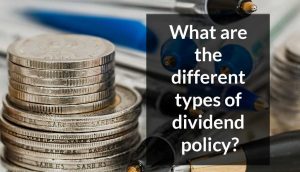The dividend policy decision involves the choice between distributing the profits belonging to the shareholders and profits retention by the firm. A dividend means, the portion of company net income which
The substitute for the payment of dividends is the retention of earnings. Retained earnings are earnings not distributed to owners as dividends; a form of internal financing. The retained earning(s) is a source of financing the investment requirements of the company. Dividends and retained earnings are competitive and conflicting. Larger retentions, lesser dividends; smaller retentions; larger dividends.
Factors Affecting Dividend Policy
The firm’s dividend policy represents a plan of action to be followed whenever the dividend decision is made. Firms develop policies consistent with their goals. Different factors influence dividend policy. The factors which influence the dividend policy are discussed below:
Shareholder’s Expectations:
Wants more dividends. The cash dividend is expected by the low-income group and retired personnel. But rich shareholders and institutional shareholders prefer more bonus shares and right shares. As a result, the directors of the company should make a decision about dividends keeping in mind the expectation of the shareholders.
Contractual Constraints:
Often, the firm’s ability to pay cash dividends is constrained by restrictive provisions in a loan contract. Generally, these constraints prohibit the payment of cash dividends until a certain level of earnings has been achieved. Or they may limit dividends to a certain taka amount or percentage of earnings. Constraints on dividends favor protecting creditors from losses due to the firm’s insolvency.
Legal requirements:
The legal stipulation does not require a dividend declaration but they specify the conditions under which dividends must be paid. Such conditions pertain to the following factors:
- Capital Impairment Rule: A firm cannot pay dividends out of its paid-up capital. Any dividends that impair capital are illegal and the directors are personally liable for the amount of illegal dividend. So, the financial manager should keep in mind that payment of dividend is in order and does not violate capital impairment rules.
- Cash dividend or Bonus share: Dividend should be paid in cash or as
bonus share. - Unearned income: Dividend should be declared out of earned income not form probable income. Moreover, a firm cannot pay cash dividends greater than the
amount of current profits plus past accumulated retained earnings. If there are past accumulated losses, they should be the first set off against current earnings at first the payment of dividend. - Insolvency: A firm is insolvent when its liabilities exceed the assets and or when it is unable to pay its bills. If the firm is currently broken in either sense, it is prohibited from paying dividends.
- Declared dividend: Once
dividend is declared should be paid within three months.
Liquidity of the firm:
Liquidity largely influences the dividend policy. A firm may have enough income but no sufficient money in hand. In this case, cash dividends should not be paid for liquidity problems.
Availability of funds:
The dividend policy is also constrained by the availability of funds and the need for additional investment. In evaluating its financial position, the firm should reck of not only its ability to increase funds but also the cost involved in it and the promptness with which financing can be obtained.
The availability of external funds to the growing firms may not be sufficient to finance a large number of acceptable investment projects. Such firms have to depend on their retained earnings. That is why large retentions are necessary for such firms.
Taxes:
The dividend policy of a firm may be dictated by the income tax status of its shareholders. If a firm has a large percentage of owners who are in high tax brackets, its dividend policy should seek to have higher retentions. Such a policy will provided its owners with income in the form of capital gains as against dividends.
Inflation:
Inflation is another factor that affects the firm’s dividend decision. With rise price, funds generated from depreciation may be inadequate to replace obsolete equipment’s.
These firm have to rely upon retained earnings as a source of funds to make up the shortfall. During the period of inflation dividend payout tends to be below.
Control:
Dividend policy may also be strongly influenced by the shareholders or the management’s control objectives. That is to say, sometimes management employs dividend policy as an effective instrument to maintain its position of command and control.
The management, in order to retain control of the company in its own
This will particularly hold good for companies which require funds to finance profitable investment opportunities when an outside group is seeking to gain control of the firm.
Capital market considerations:
Capital market consideration strongly affects dividend policy. In case the firm has easy access to the capital market. Either because it is financially strong or large in size. It can following a liberal dividend policy.
However, if the firm has only limited access to capital markets, It is likely to adopt low dividend payout ratios. Such firms are likely to rely more heavily on retained earnings as a source of financing their investment.
Investment opportunity:
If there are investment opportunities the company can pay a low cash dividend. And retain more earnings for financial solvency and growth of the company.
The above key factors are involved in the formulation of a dividend policy. A firm’s dividend policy should provide for sufficient financing and maximize the wealth of the firm’s owners.




